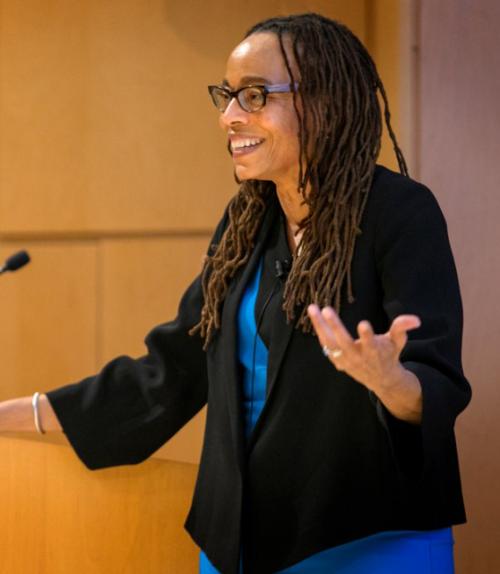The concept of “race” – the idea that humans are naturally divided into biologically distinct groups – has been definitively proven false. But the 21st century has seen a disturbing increase in scientists inaccurately presenting race as the reason for racial inequality, says an acclaimed scholar of race, gender and law.
“Social scientists absolutely should engage with this rise of racial science to work on research designs that account for structural racism and state violence and that confront the racial politics of science … and unabashedly put racial justice at the center,” said Dorothy Roberts Nov. 15.
Roberts, a professor of professor of law, Africana studies and sociology at the University of Pennsylvania, spoke on “Racism and the New Racial Science” at the 2017 Institute for the Social Sciences’ Annual Lecture in Klarman Hall.
There has been a long legacy of scientists presenting the concept of biological race as an explanation for racial inequality, Roberts said. European typologists created the idea of race in the 17th century to support slavery, colonialism and the conquest of people whom they defined as separate and inferior, Roberts said.
“The desire to enslave people, take their land, dominate them, came first,” she said. “Then scientists helped to invent the concept of biological race to give a justification for why it was moral, [why] it was naturally imperative, for Europeans to inflict these harms on other people.”
During the Enlightenment, the idea of biological determinism was incorporated into the modern sciences, emphasizing that natural laws included inequalities between races. Thomas Jefferson, for example, explained the supposed inability of black people to participate in American democracy by falsely identifying biological differences between blacks and whites, she said.
These concepts became foundational to the creation of a racial hierarchy and political and social inequality in the United States, Roberts said. They’ve had a profound impact on arenas from incarceration to medicine and education, from the practice of enslaving mixed-race children born to enslaved mothers and white slaveholders to the eugenics movement that supported sterilization of black people from the 1930s through the 1970s, Roberts said.
With the mapping of the human genome, there were high hopes that finally scientists would join forces to imagine a way of studying human beings that didn’t rely on this 17th century concept of biological race. “Instead ... it became exactly the opposite,” Roberts said.
There has been a spike in studies using a biological definition of race. One study used race to explain why black women have higher rates of premature births – but didn’t considering factors such as environmental pollution or poor diet due to poverty.
More and more, research is using the hypothesis that there is a genetic cause for the inequity, Roberts said. “And it may be a biological or health related, but it could also be a social difference: higher rates of incarceration, lower educational attainment, lower income, lower wealth – all of these racial inequalities that some scientists believe they can show are caused by something innate, inherent, in the black race.”
The idea has been transmitted to fields from biotechnology, where medicines claim they are designed to work specifically on blacks, to the social sciences, epigenetics and the neuroscience of poverty. And white nationalists are using this research to promote their own racists views, she said.
She concluded with an illustration showing a black child in utero dressed in a prison uniform, surrounded by barbed wire with the word “guilty” stamped on his head. “This black baby in the womb is being harmed by structural racism, not by his black mother’s bad behavior or genes,” Roberts said.
Roberts called on scientists to put racial justice at the center of their research. “Don’t keep falling back on biological defects of people who are surviving systems that are designed to harm them, and instead focus on how to end the systems themselves,” she said.
The lecture was co-sponsored by Cornell Law School and the Africana Studies and Research Center.
This story also appeared in the Cornell Chronicle.




